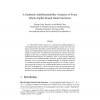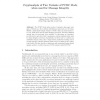124 search results - page 19 / 25 » On the Construction of Variable-Input-Length Ciphers |
ASIACRYPT
2009
Springer
14 years 1 months ago
2009
Springer
The design of cryptographic hash functions is a very complex and failure-prone process. For this reason, this paper puts forward a completely modular and fault-tolerant approach to...
DCC
2008
IEEE
14 years 7 months ago
2008
IEEE
At ASIACRYPT 2006, Chang et al. analyzed the indifferentiability of some popular hash functions based on block ciphers, namely, the twenty collision resistant PGV, the MDC2 and th...
ACISP
2005
Springer
14 years 27 days ago
2005
Springer
Abstract. The PCBC block cipher mode of operation has many variants, of which one, due to Meyer and Matyas, dates back over 20 years. Whilst a particularly simple variant of PCBC h...
CHES
2010
Springer
13 years 8 months ago
2010
Springer
The need for lightweight (that is, compact, low-power, low-energy) cryptographic hash functions has been repeatedly expressed by application designers, notably for implementing RFI...
ASIACRYPT
2007
Springer
13 years 11 months ago
2007
Springer
Abstract. Tweakable blockciphers, first formalized by Liskov, Rivest, and Wagner [13], are blockciphers with an additional input, the tweak, which allows for variability. An open p...



